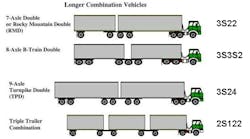The Dept. of Transportation on Friday released the technical reports of its congressionally mandated study on truck and size weight limits to mixed reviews: While the preliminary release comes with a call for peer review and public comment, highway safety groups praised the report and called on Congress to reject any truck size increases; big trucking “lambasted” it and decried DOT’s conclusions as political; and big shippers found the report “neither surprising nor unexpected” and encouraged Congress to support more productive trucks as a solution to truck capacity shortages.
The hubbub, essentially, is because the report couldn’t come up with any definitive conclusion due to insufficient data—and, given the insufficiency, DOT recommended lawmakers should not consider changes to the status quo until more research could be done, according to the summary provided in a Q&A posted along with an executive summary and the five “comparative assessment documents,” or the technical reports mandated by Congress in MAP-21, the 2012 highway bill.
In a letter to Congress explaining the findings, DOT Under Secretary Peter Rogoff suggested that “a more robust study effort” would be needed to “advance the state of practice.”
“At this time, the department believes that the current data limitations are so profound that the results cannot accurately be extrapolated to predict national impacts,” Rogoff writes in a highlighted conclusion. “As such, the Department believes that no changes in the relevant truck size and weight laws and regulations should be considered until these data limitations are overcome.”
The Truck Safety Coalition, made up of several highway safety and trucking watchdog groups, encouraged Congress to follow the recommendation and oppose a policy rider in the current DOT funding bill that would permit twin 33-foot trailers on the nation’s Interstates.
“Congressional backroom deals that result in policy changes which will increase truck crash deaths and injuries should be based on scientific data and objective research and not generous campaign contributions from powerful corporate interests,” said Joan Claybrook, chair, Citizens for Reliable and Safe Highways. “Congress should not buy a pig in a poke and impose heavier trucks on the American people with no evidence they are as safe as trucks today.”
American Trucking Assns. (ATA), which supports permitting the longer trailers, said their safe and efficient use in Florida and North Dakota demonstrate “the obvious benefits,” including saving consumers “billions of dollars.”
“Given the timing of the release of this study, it is an obvious attempt to promote administration policy, rather than give Congress the unbiased information it requested,” ATA President and CEO Bill Graves said in a statement. “It is appalling that after years of saying the study would not make recommendations, DOT officials would release this report—and recommend no change in current law—just days after the White House came out opposing truck productivity increases.”
A group of shippers organized to advocate for bigger trucks found the policy glass half full, however, and said the findings actually contribute to the “growing list” of research which “debunks several major points of opposition” to six-axle truck weight reform.
“U.S. DOT officials began this study process with the intention to only release technical findings and make no policy recommendations,” said John Runyan, executive director for the Coalition for Transportation Productivity (CTP). “The department’s inability to endorse gross vehicle weight reform without a more robust study is neither surprising nor unexpected, especially given the highly charged atmosphere surrounding this study.”
The Owner-Operator Independent Drivers Assn. has long opposed bigger trucks, maintaining that increases would not only compromise highway safety and infrastructure, but also lead to significant new cost increases for small-business truckers.



